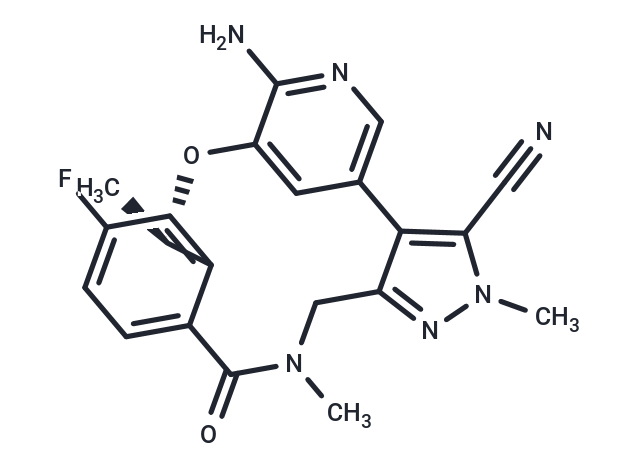 Your shopping cart is currently empty
Your shopping cart is currently empty

Lorlatinib (PF-6463922) is an orally available, ATP-competitive inhibitor of the receptor tyrosine kinases, anaplastic lymphoma kinase (ALK) and C-ros oncogene 1 (Ros1), with potential antineoplastic activity.

| Pack Size | Price | USA Warehouse | Global Warehouse | Quantity |
|---|---|---|---|---|
| 1 mg | $30 | In Stock | In Stock | |
| 2 mg | $37 | In Stock | In Stock | |
| 5 mg | $58 | In Stock | In Stock | |
| 10 mg | $86 | In Stock | In Stock | |
| 25 mg | $147 | In Stock | In Stock | |
| 50 mg | $236 | In Stock | In Stock | |
| 100 mg | $415 | In Stock | In Stock | |
| 1 mL x 10 mM (in DMSO) | $64 | In Stock | In Stock |
| Description | Lorlatinib (PF-6463922) is an orally available, ATP-competitive inhibitor of the receptor tyrosine kinases, anaplastic lymphoma kinase (ALK) and C-ros oncogene 1 (Ros1), with potential antineoplastic activity. |
| Targets&IC50 | ROS1:<0.02 nM(Ki), ALK:<0.07 nM(Ki), TYK1/LTK:2.7 nM, ALK (L1196M):0.07 nM(Ki), FER:3.3 nM |
| In vitro | PF-06463922 effectively inhibits cell proliferation and induces apoptosis in HCC78 human NSCLC cells containing SLC34A2-ROS1 fusions and in BaF3-CD74-ROS1 cells expressing human CD74-ROS1. It also demonstrates this inhibitory action on cell proliferation and induces apoptosis in NSCLC cells with either non-mutated or mutated ALK fusions. PF-06463922 exhibits significant cellular activity against ALK and a wide range of ALK clinical mutations (IC50=0.2-77 nM). |
| In vivo | In NIH3T3 xenograft models expressing human CD74-ROS1 and Fig-ROS1, PF-06463922 inhibits cell proliferation by repressing ROS1 phosphorylation and downstream signaling molecules, including Cyclin D1. Furthermore, PF-06463922 demonstrates significant antitumor activity in mice bearing tumor grafts that overexpress EML4-ALK, EML4-ALK-L1196M, EML4-ALK-G1269A, EML4-ALK-G1202R, or NPM-ALK. |
| Kinase Assay | Recombinant human wild-type and mutant ALK kinase domain proteins (amino acids 1093–1411) are produced in-house using baculoviral expression, preactivated via autophosphorylation with MgATP, and assayed for kinase activity using a microfluidic mobility shift assay. The reactions contained 1.3 nM wild-type ALK or 0.5 nM mutant ALK (appropriate to produce 15-20% phosphorylation of peptide substrate after 1 h of reaction), 3 μM 5-FAM-KKSRGDYMTMQIG-CONH2), 5 mM MgCl2, and the Km level of ATP in 25 mM Hepes, pH 7.1. The inhibitors are shown to be ATP-competitive from kinetic and crystallographic studies. The Ki values are calculated by fitting the conversion (%) to a competitive inhibition equation. ROS1 enzyme is assayed as described above for ALK, except using 0.25 nM recombinant human ROS1 catalytic domain (amino acids 1883-2347). Kinase inhibitor selectivity is evaluated using a 206-kinase panel. |
| Cell Research | Cells are seeded in 96-well plates in growth medium containing 10% FBS and are cultured overnight at 37°C. The following day, serial dilutions of PF-06463922 or appropriate controls are added to the designated wells, and cells are incubated at 37°C for 72 h. A CellTiter-Glo assay is performed to determine the relative cell numbers. IC50 values are calculated by concentration-response curve fitting using a four-parameter analytical method. |
| Synonyms | PF-6463922, PF-06463922, Loratinib |
| Molecular Weight | 406.41 |
| Formula | C21H19FN6O2 |
| Cas No. | 1454846-35-5 |
| Smiles | C[C@H]1Oc2cc(cnc2N)-c2c(CN(C)C(=O)c3ccc(F)cc13)nn(C)c2C#N |
| Relative Density. | 1.42 g/cm3 (Predicted) |
| Storage | keep away from moisture,store under nitrogen,store at low temperature | In solvent: -80°C for 1 year | Shipping with blue ice/Shipping at ambient temperature. | |||||||||||||||||||||||||||||||||||
| Solubility Information | Ethanol: 40.6 mg/mL (99.9 mM), Sonication is recommended. DMSO: 13 mg/mL (31.99 mM), Sonication is recommended. | |||||||||||||||||||||||||||||||||||
| In Vivo Formulation | 10% DMSO+40% PEG300+5% Tween 80+45% Saline: 2 mg/mL (4.92 mM), Sonication is recommended. Please add the solvents sequentially, clarifying the solution as much as possible before adding the next one. Dissolve by heating and/or sonication if necessary. Working solution is recommended to be prepared and used immediately. The formulation provided above is for reference purposes only. In vivo formulations may vary and should be modified based on specific experimental conditions. | |||||||||||||||||||||||||||||||||||
Solution Preparation Table | ||||||||||||||||||||||||||||||||||||
DMSO/Ethanol
Ethanol
| ||||||||||||||||||||||||||||||||||||
Dissolve 2 mg of the compound in 100 μL DMSO![]() to obtain a stock solution at a concentration of 20 mg/mL . If the required concentration exceeds the compound's known solubility, please contact us for technical support before proceeding.
to obtain a stock solution at a concentration of 20 mg/mL . If the required concentration exceeds the compound's known solubility, please contact us for technical support before proceeding.
1) Add 100 μL of the DMSO![]() stock solution to 400 μL PEG300
stock solution to 400 μL PEG300![]() and mix thoroughly until the solution becomes clear.
and mix thoroughly until the solution becomes clear.
2) Add 50 μL Tween 80 and mix well until fully clarified.
3) Add 450 μL Saline,PBS or ddH2O![]() and mix thoroughly until a homogeneous solution is obtained.
and mix thoroughly until a homogeneous solution is obtained.
| Size | Quantity | Unit Price | Amount | Operation |
|---|

Copyright © 2015-2026 TargetMol Chemicals Inc. All Rights Reserved.